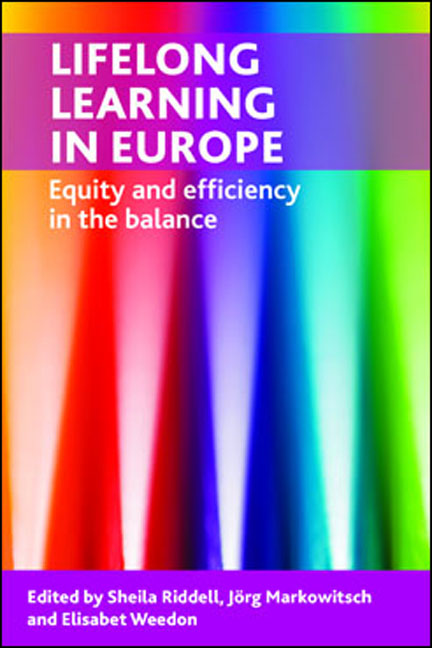Book contents
- Frontmatter
- Contents
- List of figures, tables and case studies
- Notes on contributors
- List of contributors, by country, to the EU Sixth Framework Project ‘Towards a Lifelong Learning Society in Europe: The Contribution of the Education System’ (LLL2010)
- one Lifelong learning and the generation of human and social capital
- two Lifelong learning and the wider European socioeconomic context
- three Neoliberal and inclusive themes in European lifelong learning policy
- four Formal adult education in the spotlight: profiles, motivations and experiences of participants in 12 European countries
- five The sociodemographic obstacles to participating in lifelong learning across Europe
- six The qualification-providing enterprise? Support for formal adult education in small and medium-sized enterprises
- seven Reducing or reinforcing inequality: assessing the impact of European policy on widening access to higher education
- eight Conclusion: the role of lifelong learning in reducing social inequality at a time of economic crisis
- Technical annex to Chapter Four
- Glossary of terms and abbreviations
- Index
eight - Conclusion: the role of lifelong learning in reducing social inequality at a time of economic crisis
Published online by Cambridge University Press: 01 September 2022
- Frontmatter
- Contents
- List of figures, tables and case studies
- Notes on contributors
- List of contributors, by country, to the EU Sixth Framework Project ‘Towards a Lifelong Learning Society in Europe: The Contribution of the Education System’ (LLL2010)
- one Lifelong learning and the generation of human and social capital
- two Lifelong learning and the wider European socioeconomic context
- three Neoliberal and inclusive themes in European lifelong learning policy
- four Formal adult education in the spotlight: profiles, motivations and experiences of participants in 12 European countries
- five The sociodemographic obstacles to participating in lifelong learning across Europe
- six The qualification-providing enterprise? Support for formal adult education in small and medium-sized enterprises
- seven Reducing or reinforcing inequality: assessing the impact of European policy on widening access to higher education
- eight Conclusion: the role of lifelong learning in reducing social inequality at a time of economic crisis
- Technical annex to Chapter Four
- Glossary of terms and abbreviations
- Index
Summary
Introduction
The LLL2010 project began in 2005 during a period of social optimism, following the expansion of the EU and a decade of sustained economic growth. Lifelong learning was regarded as having important economic and social benefits in terms of producing a flexible workforce, supporting social mobility and stimulating personal growth and development. The LLL2010 project had a particular focus on exploring the extent to which lifelong learning could contribute to social inclusion, as countries struggled to adjust to the challenges of globalisation, the shifting of economic power to East Asia and, latterly, the threatened collapse of the European Union itself. Building social cohesion was a particular challenge for new member states in Central and Eastern Europe, adapting to the collapse of the old Soviet Union and the demands of the EU to develop new institutions and systems of governance. At the end of the LLL2010 project, the economic and social outlook has changed from one of optimism and growth, to a much more pessimistic prospect of relative and absolute economic decline in many European countries, a faltering currency and the threatened implosion of the state in several countries. Questions therefore arise about the future survival of lifelong learning as a force for building social cohesion, promoting social mobility and contributing to the task of economic rebuilding. In this concluding chapter we consider some of the overarching themes and questions to emerge from the preceding chapters. It should be noted that writing a conclusion to a book of this type at the present point in time (December 2011) is extremely challenging because of huge levels of uncertainty in relation to the global economy, the eurozone and, consequently, the social welfare systems of European countries, including their systems of lifelong learning.
Bounded agency and the motivation of adult learners in different European countries
To begin on a note of optimism, it is evident that adult learners at all levels have considerable enthusiasm to engage in learning for a variety of reasons connected with securing their financial future, but also to feel rooted within their local community and wider society. The survey of adult motivation described in Chapter Four demonstrated that intrinsic motivation was important in all countries and to learners at all levels, suggesting that economic instrumentalism is very far from the sole, or even the main, driver of the decision to participate in adult education.
- Type
- Chapter
- Information
- Lifelong Learning in EuropeEquity and Efficiency in the Balance, pp. 151 - 162Publisher: Bristol University PressPrint publication year: 2012



